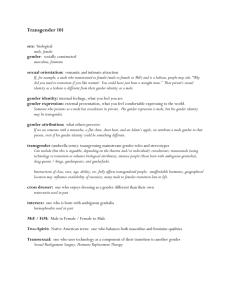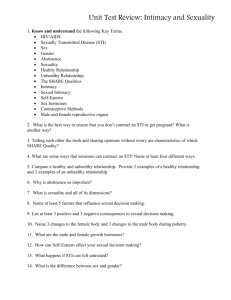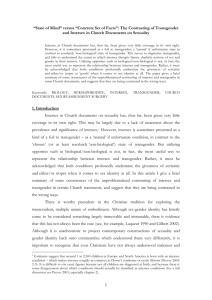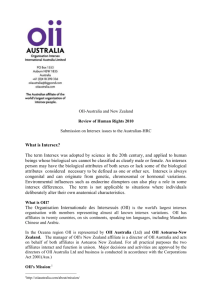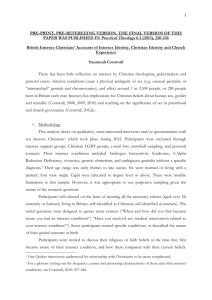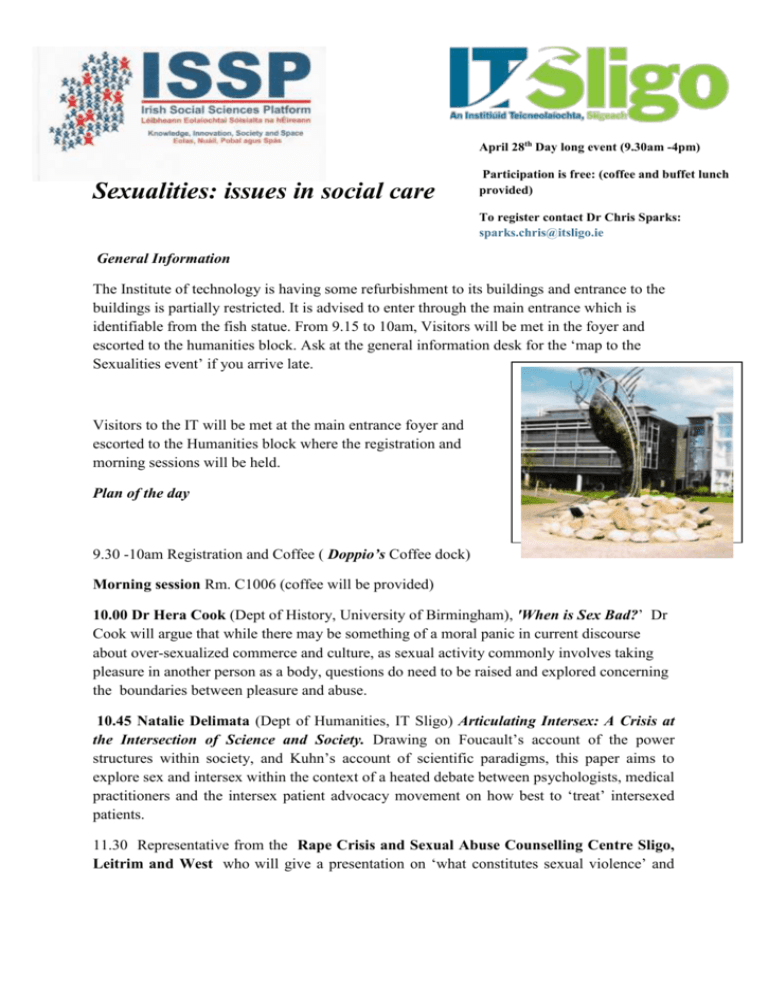
April 28th Day long event (9.30am -4pm)
Sexualities: issues in social care
Participation is free: (coffee and buffet lunch
provided)
To register contact Dr Chris Sparks:
sparks.chris@itsligo.ie
General Information
The Institute of technology is having some refurbishment to its buildings and entrance to the
buildings is partially restricted. It is advised to enter through the main entrance which is
identifiable from the fish statue. From 9.15 to 10am, Visitors will be met in the foyer and
escorted to the humanities block. Ask at the general information desk for the ‘map to the
Sexualities event’ if you arrive late.
Visitors to the IT will be met at the main entrance foyer and
escorted to the Humanities block where the registration and
morning sessions will be held.
Plan of the day
9.30 -10am Registration and Coffee ( Doppio’s Coffee dock)
Morning session Rm. C1006 (coffee will be provided)
10.00 Dr Hera Cook (Dept of History, University of Birmingham), 'When is Sex Bad?’ Dr
Cook will argue that while there may be something of a moral panic in current discourse
about over-sexualized commerce and culture, as sexual activity commonly involves taking
pleasure in another person as a body, questions do need to be raised and explored concerning
the boundaries between pleasure and abuse.
10.45 Natalie Delimata (Dept of Humanities, IT Sligo) Articulating Intersex: A Crisis at
the Intersection of Science and Society. Drawing on Foucault’s account of the power
structures within society, and Kuhn’s account of scientific paradigms, this paper aims to
explore sex and intersex within the context of a heated debate between psychologists, medical
practitioners and the intersex patient advocacy movement on how best to ‘treat’ intersexed
patients.
11.30 Representative from the Rape Crisis and Sexual Abuse Counselling Centre Sligo,
Leitrim and West who will give a presentation on ‘what constitutes sexual violence’ and
discuss the kinds of encounters involved in working with people who have undergone this
experience.
12.15 Grace Kelly (Department of Applied Social Studies, University College Cork), Rights,
sexuality and relationships in Ireland: ‘It’d be nice to be kind of trusted’. This paper
explores the cultural and legal restrictions placed upon the sexual dimensions of the personal
lives of people with disability what a group of people with intellectual disabilities in
contemporary Ireland. It will present the evidence of these restrictions and suggestions for a
new approach derived from field research in which people with disabilities spoke about their
experiences of relationships and sexuality.
1pm Lunch will be held in the BIC building conference room.
Concurrent Workshops 2pm-3.30pm (Coffee will be provided ):
Workshop A. (BIC Conference Room ) Chaired by Jessica Mannion, run with ’Connect”
Irish sex education peer support group: Issues of sexuality for people with disabilities.
Workshop B. (C1002 TBC) (Chaired by Jackie O’Toole run with DVAS (Domestic
Violence Advocacy Service, Sligo, Leitrim and West ) 'Issues around the proliferation and
normalisation of pornography'
Workshop C. (BIC Meeting Room) Chaired by Dr Kate Duke run with Rape Crisis and
Sexual Abuse Counselling Centre Sligo, Leitrim and West the: Workshop on caring for
survivors of sexual violence
3.30-4pm (C1002) Plenary and conclusion
Summary of presentations
Dr Hera Cook
Current sexual discourses, especially those on children and sexuality, make it evident that
many people feel, as they did in the early twentieth century, that sexuality per se is inherently
dangerous or bad or damaging – in other words sex does not have to be linked to violence or
exploitation or abuse to be a negative force. This is fundamental to many people’s fears about
the 'sexualisation' of children and it seems to have been felt by many with equal force
throughout the 20th century, regardless of the extent to which the experience of sexuality had
changed. Those who do not share this belief (of whom I am one) tend to reject it without
examination. But sex involves taking pleasure in another person as a body; where are the
boundaries between pleasure and abuse? What is the difference between sexual need and
other forms of intense desire for a person – for a friend, for a baby, for a mother? How, in
what fashion, or to what extent, might sexual desire be inherently corrupting? One possible
route to this is asking when and how does sexual desire create what Martin Buber called I-it
relationships in which the other is used rather than being considered as a person with whom
‘I’ might have an I-thou relationship, one in which I recognise their needs, desires and
vulnerabilities? And how then is abuse differentiated from positive experiences in contexts
such as bathhouses where sex involves no intimacy? And what of those who actively reject
the 1970s search for equality in sexual relationships?
Natalie Delimata
Articulating Intersex: A Crisis at the Intersection of Science and Society
In an attempt to resolve the moral, legal and social discordance presented by the bodies of
sexually ambiguous patients, clinicians have tried to identify the key biological signifier for
sex through close inspection of the intersexed body. Following a century of anatomical
investigation increasingly complex interpretations of sex were produced but none that could
resolve the issue of intersex ambiguity (Dreger 1999, Fausto-Sterling 2000). Given that our
culture operates in accordance with a two-sex model this lack of clear definition between the
sexes threatened the authenticity of this model on which many social structures depend
(Fausto-Sterling 2000). During the 1950’s a psychologist Dr. John Money presented a
resolution to this problem. By arguing that gender is learned through socialisation rather than
biologically innate, Money took the body out of the equation. He argued that as long as the
appearance of the genitalia was in accordance with the assigned gender, parents would
unambiguously rear their child in the appropriate gender role. In order to ensure that the child
develop a healthy gender identity Money advocated surgical ‘correction’ of ambiguous
genitalia, hormone therapy and the elimination of any gender ambiguous terms in dealing
with intersexed patients or their parents (Money et al. 1972). For forty years Money’s
intersex treatment model was practiced throughout the West rendering intersex almost totally
culturally invisible (www.isna.org, Kessler 1998). However the collapse of his most
influential case study (Diamond et al.1997a) and the emergence of a highly critical intersex
patient advocacy movement has, in the last decade, brought about a crisis within this medical
field sparking a heated debate on how best to treat intersexed patients (Harper 2007, Preves
2005, Diamond et al. 1997b, Sytsma 2006, Dreger 1999).
Drawing on Foucault’s account of the power structures within society, and Kuhn’s account of
scientific paradigms this paper aims to explore sex and intersex within the context of this
debate (Foucault 1972, Foucault 1980, Kuhn 1996). In doing so this paper hopes to describe
how social practices have evolved in order to eliminate sex variation. Drawing on my current
research into the treatment of intersex in Ireland I hope to demonstrate how the cultural
invisibility of intersex, coupled with stricter ethical practices, particularly with regard to
diagnostic disclosure, are leading clinicians into the very difficult situation of describing their
patients’ sex in culturally unintelligible terms. Clinicians appear to be operating across two
incompatible paradigms; the social and the biological. The former recognises only two sexes
while the latter describes sex as multiplicitous. The close relationship between the body and
identity within our culture means by ascribing a diagnosis of intersex, clinicians are reifying
gender identities that are culturally meaningless which has a profound effect on their patients.
Grace Kelly:
Rights, sexuality and relationships in Ireland: ‘It’d be nice to be kind of trusted’
How to translate the right of people with intellectual disabilities to a full sexual and intimate
life into proactive support remains a challenge for disabilities services in Ireland. Little
formal research has been undertaken in this country into what people with intellectual
disabilities think about these issues and what they would like to see happen in this area of
their lives. This paper presents a preliminary analysis of the first author’s PhD research into
the views and experiences of a small group of Irish people with intellectual disabilities in the
area of sexuality and relationships. Initial findings suggest that people with intellectual
disabilities are getting insufficient sex education and that changes are needed at a disabilities
service level to ensure that people with intellectual disabilities can express their sexuality in
an open and supportive climate. At a government level, changes will need to be made to Irish
legislation concerning the sexuality of vulnerable adults so that this country is meeting its
obligations under the UN Convention on the Rights of Persons with Disabilities (2006). The
authors argue that people with intellectual disabilities’ views must come first in all debates
concerning their sexuality.




